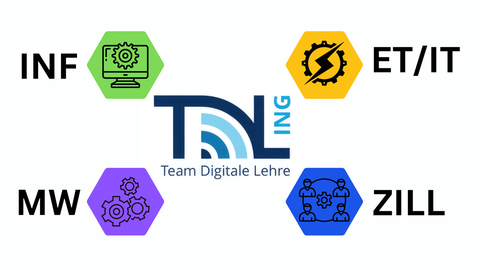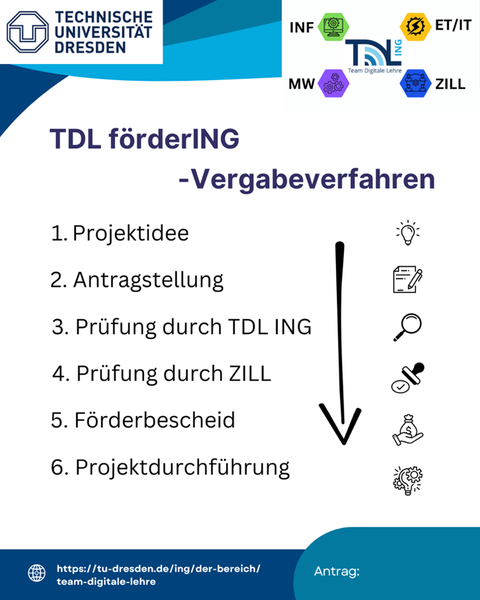TDL förderING
Click here for the application form.
Applications can be submitted until 27.06.2025 at 21:00. After this time, no further applications will be accepted and the evaluation phase will begin. After all applications received have been processed, the applicants will be informed of the decisions.
The Digital Teaching ING team (TDL ING) consists of representatives from the Faculties of Computer Science, Mechanical Science and Engineering, Electrical and Computer Engineering and the ZiLL. To ensure equal treatment between the individual faculties, each faculty will be allocated one third of the total funds. Funding is provided for personnel and material resources.
Together with the entire TDL ING, a simplified application form was created based on the award criteria (see below). The application form consists of brief, targeted information on the use of project funds and additional metadata on the project that can be ticked. Applicants can submit posters or an additional financial overview for better understanding. This data is intended to emphasize links to the existing TSP ING offer and can be easily adapted in the future. In order to keep the evaluation effort low and transparent and to speed up the process, the application is evaluated according to points. In order to convey content better, it is possible to add illustrations to the application. The entire TDL ING supports each other if the evaluation of applications is too time-consuming.
The maximum amount of funding requested is €3,333.00.
Funding is provided for personnel and material resources.
You must submit a financial calculation for the application to be approved. This must show the total amount requested. Divide the planned costs into material and personnel resources. Other sources of funding must also be listed in this calculation.
Notes on funding:
- Double funding from TDL FörderING and other sources is not permitted.
- If your actual costs exceed the funding amount, these must be covered elsewhere.
The call for applications is made via the TDL ING website. In order to generate the necessary reach, especially in the first year, the TDL ING representatives will approach lecturers and promote the new format via various channels. The representatives of the TDL ING are available to answer any questions regarding the application.
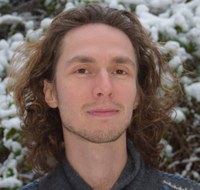 © Alexander Alfred Zyla
© Alexander Alfred Zyla
Research associate
NameAlexander Alfred Zyla
Faculty of Electrical and Computer Engineering
Send encrypted email via the SecureMail portal (for TUD external users only).
Dean's office, Faculty of Electrical and Computer Engineering
Dean's office, Faculty of Electrical and Computer Engineering
Visiting address:
Barkhausen-Bau, BAR 167 Helmholtzstr. 18
01069 Dresden
None
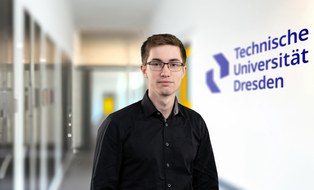
Research Associate, PhD Student
NameDipl.-Ing. Sebastian Kucharski
Technology-enhanced Learning
Send encrypted email via the SecureMail portal (for TUD external users only).
Chair of Distributed and Networked Systems
Visiting address:
Andreas-Pfitzmann-Bau, Room 3085 Nöthnitzer Straße 46
01187 Dresden
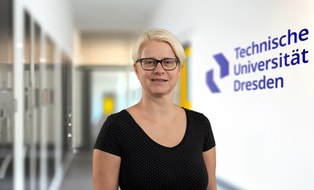
Senior Research Associate
NameDr.-Ing. Iris Braun
Cloud Computing, TE Learning, Equal Opportunities Officer
Send encrypted email via the SecureMail portal (for TUD external users only).
Chair of Distributed and Networked Systems
Visiting address:
Andreas-Pfitzmann-Bau, Room 3084 Nöthnitzer Straße 46
01187 Dresden
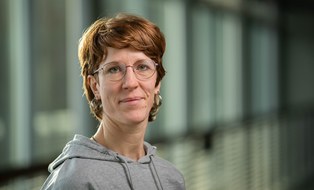 © Sven Ellger
© Sven Ellger
Research Associate
NameJette Schwick M.Sc.
Send encrypted email via the SecureMail portal (for TUD external users only).
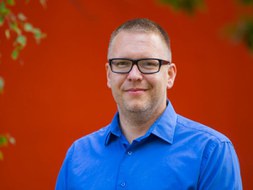 © Ronny Rozum
© Ronny Rozum
Wissenschaftlicher Mitarbeiter
NameMatthias Heinz
Zentrum für interdisziplinäres Lernen und Lehren (ZiLL)
Send encrypted email via the SecureMail portal (for TUD external users only).
Applications are evaluated in particular according to the objectives of the current call for proposals of the Digital Teaching Fund:
- Promotion of the individualization of learning processes and paths
- Promoting interaction and participation in teaching
- Supporting teaching activities by promoting digital skills
- Promoting the acquisition of skills in dealing with AI and its use in studies and teaching
- New edition or expansion of existing offers, taking diversity and accessibility into account
- Increasing the visibility of TU Dresden nationally and internationally through Open Educational Resources and/or Practices (OER/OEP)
In addition, the following points of the applications are used for evaluation
- Plausibility of feasibility within the framework of the requested funds
- Effective use of the requested funds
- Possibilities for the independent continuation of a project
- Relationships between the metadata collected (SGDs and priorities of the TSP ING) and the project application text
- Plausibility and scope of scalability
For safety reasons, each evaluation at each faculty is carried out by at least two representatives of the TSP ING. In the event of disagreement, an additional representative from the TSP ING is consulted and a simple majority vote is taken. For specific applications, the experts of a requested field of the TSP ING are consulted for evaluation.
Approved applications agree to submit a progress report in the form of a blog post on the TDL ING NEWS page, which contains a description of the project and a retrospective of the project process.
Particularly outstanding projects will be given the opportunity to present their project in the form of a poster or lecture at a TSP-associated event (e.g. E-Teaching Day, Festival of Teaching/Day of Teaching, etc.).
Once the project has been completed, an evaluation is offered and carried out in order to improve the funding program.
A data protection regulation is attached to each application, which must be signed in order to participate. In this declaration, applicants can also allow the funding to be mentioned in publications or works.
In addition, a utilization sheet is attached, which assures that the data and content collected through the funding may be further used by the TDL ING for internal evaluations, public relations (presentation on the website, news, etc.) and research questions.
All participants undertake in writing to submit only one application for funding and, if approved, not to submit it a second time.
The funded projects and the results of the evaluation are published on the TSP ING website.
All applications, the associated information and collected data are saved on a central drive of the TSP ING. To ensure data security and data protection, group drives and the ZIH's datashare are used for this purpose.

